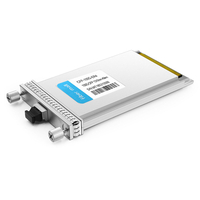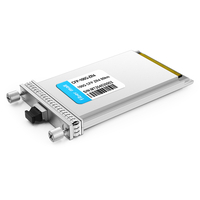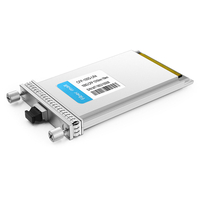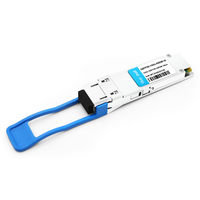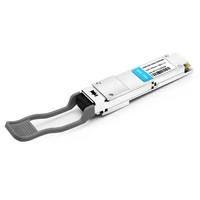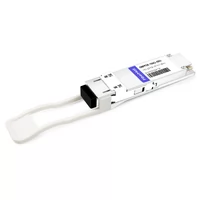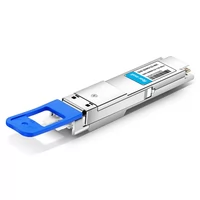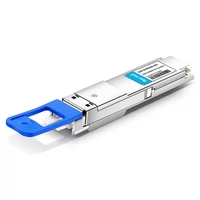With the development of 100G Ethernet becoming a trend, the demand for 100G optical modules is increasing, and today 100G optical modules account for a large portion of the network construction cost. Three solutions have emerged in 100G 80km DCI (Data Center Interconnect), namely 100G coherent, 100G PAM4 DWDM, and 100G QSFP28 ZR4. This article introduces 100G QSFP28 ZR4 optical modules and compares them with the first two to discuss why QSFP28 ZR4 is the best choice for 100G long-haul DCI.
Table of Contents
ToggleIntroduction of 100G QSFP28 ZR4
The 100G QSFP28 ZR4 optical transceiver is used to connect switches, routers, and transmission equipment in the data center, and the transmission distance is up to 80km over single-mode fiber(SMF).
The 100G QSFP28 ZR4 optical module is fully compliant with the QSFP28 industry standard and associated MSA as described in the latest SFF-8665/8636, and is available with digital diagnostics via the I2C interface. It is also compliant with the IEEE 802.3 100GBASE-ZR4 related specifications. In addition, the module supports the standard KR4 FEC (Forward Error Correction) baud rate, which will help detect and correct errors on the receiving side to improve the overall quality of the link.
Operating principle of 100G QSFP28 ZR4
At the transmitting end, the four channels of serial data (NRZ, Not Return to Zero) are recovered by the CDR and passed to four laser drivers with center wavelengths of 1296nm, 1300nm, 1305nm, and 1309nm, respectively. The optical signal is multiplexed to a single-mode fiber(SMF) via a standard LC connector. At the receiving end, the optical signals of the four channels are amplified by SOA and then demultiplexed by an integrated optical demultiplexer. Each optical signal is recovered by a PIN detector and then passed through a transimpedance amplifier and CDR to a CAUI-4 compliant output driver, as shown in the following figure:
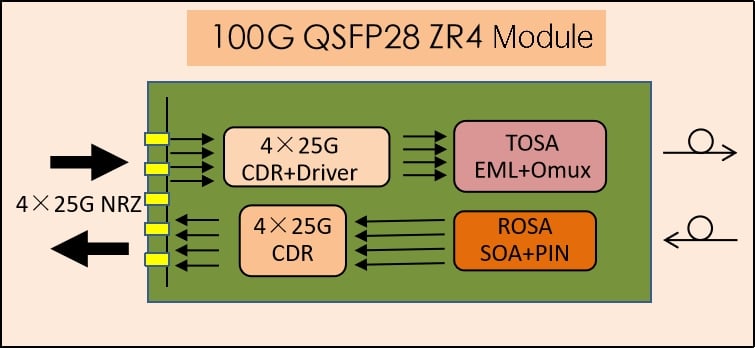
100G QSFP28 ZR4 Block Diagram
Three types of solutions for 100G 80km DCI
Metropolitan area networks and DCI(Data Center Interconnect) refer to very large data centers and large network switches connected within cities. They need many high bandwidth connections at a 100G+ data rate, which requires the optical modules to simplify operation, reduce space, and reduce cost and power consumption.
- 100G Coherent
Traditionally, switch vendors use CFP / CFP2 coherent optical modules in their DCI devices. Coherent technology is usually used for long-distance metropolitan optical transmission. More advanced modulation technologies, such as QPSK, 8QAM or 16QAM, can double, triple or quadruple the bit rate. However, this kind of modulation needs advanced technology, that is, coherent detection and DSP on the receiver side to correct the dispersion. Although the cost per bit is still a concern, the component cost is very high, and the optical module needs space and a sufficient power budget, which is only available on the pluggable packages of CFP and CFP2. Of course, coherent modules can also be inserted into the switch/router board of the IPoDWDM scenario. However, due to the large power consumption and size of the CFP / CFP2 module, special line cards are needed.
- 100G PAM4 DWDM
The PAM4 optical module is designed to respond to the need for an optical module for short-distance links. Before PAM4, the binary NRZ modulation format was used for 100G long distance and 40G data transmission networks. PAM4 comes with four different code patterns for encoding two data bits, so the bandwidth of the connection can be doubled with this modulation format. In addition, PAM4 optical modules can be used directly in the switches of embedded DWDM networks, which is a cost-effective and simple solution for customers willing to build embedded DWDM data networks. However, the disadvantage of this solution is that 100G DWDM QSFP28 PAM4 requires the use of amplification and dispersion compensation systems on the optical link when the transmission distance is greater than 5km, which results in higher end-to-end costs.

QSFP28 PAM4 DWDM to 100G 80km DCI
- 100G QSFP28 ZR4
QSFP28 ZR4 overcomes the disadvantages of the above two solutions. After cost optimization, the 100G ZR4 QSFP28 supports 100G Ethernet and can realize transmission up to 80km. Moreover, QSFP28 ZR4 is small in size and low in power consumption. It can provide a point-to-point solution in the data center without deploying the old version of the CFP / CFP2 interface and can operate on a point-to-point link up to 80km without optical amplification and dispersion compensation. This is a true plug-and-play solution.
As shown in the figure below:

Summary
To sum up, among the three solutions for 100G 80km DCI(Data Center Interconnect), 100G QSFP28 ZR4 has significant cost and power advantages over coherent solutions, and it can achieve point-to-point optical transmission without deploying redundant and complex equipment, so 100G QSFP28 ZR4 is the most preferred in long-haul DCI applications.
Specifications 100G QSFP28 ZR4 100G QSFP28 PAM4 DWDM 100G Coherent(CFP/CFP2)
Wave range LWDM DWDM DWDM
Modulation format NRZ PAM4 DP-QPSK
Application distance 80km 80km 80km
HOST FEC ON ON ON
Temperature 0~70°c 0~70°c 0~70°c
Power consumption 6W 5W 15W
Dispersion compensation O-BAND; no need consider dispersion compensation ±100ps/nm; need consider dispersion compensation for 80km no need
EDFA no need need need
DCM no need need no need
Link cost low medium high
Expandable cannot can can
Related Products:
-
 CFP-100G-ER4 100G CFP ER4 1310nm 40km LC SMF DDM Transceiver Module
$2650.00
CFP-100G-ER4 100G CFP ER4 1310nm 40km LC SMF DDM Transceiver Module
$2650.00
-
 CFP-100G-ZR4 100G CFP ZR4 LWMD4 80km LC SMF DDM Transceiver Module
$3000.00
CFP-100G-ZR4 100G CFP ZR4 LWMD4 80km LC SMF DDM Transceiver Module
$3000.00
-
 Cisco CFP-100G-LR4 Compatible 100G CFP LR4 1310nm 10km LC SMF DDM Transceiver Module
$1100.00
Cisco CFP-100G-LR4 Compatible 100G CFP LR4 1310nm 10km LC SMF DDM Transceiver Module
$1100.00
-
 QSFP28-100G-4WDM-10 100G QSFP28 4WDM 10km LC SMF DDM Transceiver Module
$200.00
QSFP28-100G-4WDM-10 100G QSFP28 4WDM 10km LC SMF DDM Transceiver Module
$200.00
-
 QSFP28-100G-SWDM4 100G QSFP28 SWDM4 850nm-940nm 100m LC MMF DDM Optical Transceiver
$300.00
QSFP28-100G-SWDM4 100G QSFP28 SWDM4 850nm-940nm 100m LC MMF DDM Optical Transceiver
$300.00
-
 QSFP28-100G-ZR4 100G QSFP28 ZR4 1296-1309nm LWDM 80km LC SMF DDM Transceiver Module
$1500.00
QSFP28-100G-ZR4 100G QSFP28 ZR4 1296-1309nm LWDM 80km LC SMF DDM Transceiver Module
$1500.00
-
 Q28-2DW2122-80C 100G DWDM QSFP28 PAM4 80km C21 C22 100GHz CS DDM Optical Transceiver
$1600.00
Q28-2DW2122-80C 100G DWDM QSFP28 PAM4 80km C21 C22 100GHz CS DDM Optical Transceiver
$1600.00
-
 Q28-2DW5960-80C 100G DWDM QSFP28 PAM4 80km C59 C60 100GHz CS DDM Optical Transceiver
$1600.00
Q28-2DW5960-80C 100G DWDM QSFP28 PAM4 80km C59 C60 100GHz CS DDM Optical Transceiver
$1600.00

